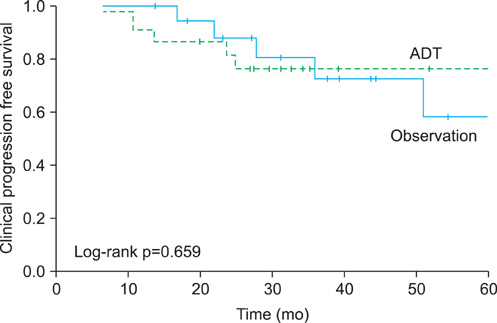Korean J Urol.
2011 Nov;52(11):741-745.
Impact of Adjuvant Androgen-Deprivation Therapy on Disease Progression in Patients with Node-Positive Prostate Cancer
- Affiliations
-
- 1Department of Urology, Asan Medical Center, University of Ulsan College of Medicine, Seoul, Korea. hjahn@amc.seoul.kr
- 2Department of Urology, Inje University College of Medicine, Seoul, Korea.
Abstract
- PURPOSE
The survival benefits of adjuvant androgen-deprivation therapy (ADT) in prostate cancer and lymph node metastasis remain unclear. We assessed the role of ADT in disease progression after radical prostatectomy (RP).
MATERIALS AND METHODS
Of 937 patients who underwent RP, we identified 40 (4.2%) who had lymph node metastasis. A total of 18 received adjuvant ADT (ADT group) and 22 were observed (observation group). Clinical progression-free survival (PFS), cancer- specific survival (CSS), and overall survival (OS) were compared in the 2 groups. Prognostic factors for clinical progression and biochemical recurrence (BCR) were analyzed.
RESULTS
The 5-year PFS, CSS, and OS of the entire cohort were 75.0%, 85.0%, and 72.5%, respectively. In the ADT group, 6 patients (33.3%) showed clinical progression at a median 42.7 months. The 5-year PFS, CSS, and OS rates of this group were 72.2%, 83.3%, and 72.2%, respectively. In the observation group, 14 patients (63.6%) received salvage therapy owing to BCR. Nine patients (40.9%) with BCR in the observation group showed clinical progression at a median 43.4 months after RP. The 5-year PFS, CSS, and OS rates of this group were 77.2%, 86.4%, and 72.8%, respectively. In the observation group, the BCR rate was lower in patients with pT3a or less disease than in those with pT3b disease.
CONCLUSIONS
Adjuvant ADT in node-positive prostate cancer did not reduce or delay disease progression or improve survival. Because a substantial number of untreated patients with pT3a or less disease did not experience recurrence, administration of ADT should be initiated carefully. However, in patients with pT3b disease, adjuvant ADT and radiotherapy could be considered.
Keyword
MeSH Terms
Figure
Reference
-
1. Ghavamian R, Bergstralh EJ, Blute ML, Slezak J, Zincke H. Radical retropubic prostatectomy plus orchiectomy versus orchiectomy alone for pTxN+ prostate cancer: a matched comparison. J Urol. 1999. 161:1223–1227.2. Spiess PE, Lee AK, Busby JE, Jordan JJ, Hernandez M, Burt K, et al. Surgically managed lymph node-positive prostate cancer: does delaying hormonal therapy worsen the outcome? BJU Int. 2007. 99:321–325.3. Bader P, Burkhard FC, Markwalder R, Studer UE. Disease progression and survival of patients with positive lymph nodes after radical prostatectomy. Is there a chance of cure? J Urol. 2003. 169:849–854.4. Kroepfl D, Loewen H, Roggenbuck U, Musch M, Klevecka V. Disease progression and survival in patients with prostate carcinoma and positive lymph nodes after radical retropubic prostatectomy. BJU Int. 2006. 97:985–991.5. Heidenreich A, Varga Z, Von Knobloch R. Extended pelvic lymphadenectomy in patients undergoing radical prostatectomy: high incidence of lymph node metastasis. J Urol. 2002. 167:1681–1686.6. Zwergel U, Lehmann J, Wullich B, Schreier U, Remberger K, Zwergel T, et al. Lymph node positive prostate cancer: long-term survival data after radical prostatectomy. J Urol. 2004. 171:1128–1131.7. Daneshmand S, Quek ML, Stein JP, Lieskovsky G, Cai J, Pinski J, et al. Prognosis of patients with lymph node positive prostate cancer following radical prostatectomy: long-term results. J Urol. 2004. 172:2252–2255.8. Kramer SA, Cline WA Jr, Farnham R, Carson CC, Cox EB, Hinshaw W, et al. Prognosis of patients with stage D1 prostatic adenocarcinoma. J Urol. 1981. 125:817–819.9. Bolla M, Gonzalez D, Warde P, Dubois JB, Mirimanoff RO, Storme G, et al. Improved survival in patients with locally advanced prostate cancer treated with radiotherapy and goserelin. N Engl J Med. 1997. 337:295–300.10. Messing EM, Manola J, Yao J, Kiernan M, Crawford D, Wilding G, et al. Immediate versus deferred androgen deprivation treatment in patients with node-positive prostate cancer after radical prostatectomy and pelvic lymphadenectomy. Lancet Oncol. 2006. 7:472–479.11. You D, Jeoung IG, Kim CS. Role of radical prostatectomy for high-risk prostate cancer. Korean J Urol. 2010. 51:589–595.12. Messing EM, Manola J, Sarosdy M, Wilding G, Crawford ED, Trump D. Immediate hormonal therapy compared with observation after radical prostatectomy and pelvic lymphadenectomy in men with node-positive prostate cancer. N Engl J Med. 1999. 341:1781–1788.13. Wong YN, Freedland S, Egleston B, Hudes G, Schwartz JS, Armstrong K. Role of androgen deprivation therapy for node-positive prostate cancer. J Clin Oncol. 2009. 27:100–105.14. Cheng L, Zincke H, Blute ML, Bergstralh EJ, Scherer B, Bostwick DG. Risk of prostate carcinoma death in patients with lymph node metastasis. Cancer. 2001. 91:66–73.15. Boorjian SA, Thompson RH, Siddiqui S, Bagniewski S, Bergstralh EJ, Karnes RJ, et al. Long-term outcome after radical prostatectomy for patients with lymph node positive prostate cancer in the prostate specific antigen era. J Urol. 2007. 178:864–870.16. Gjertson CK, Asher KP, Sclar JD, Goluboff ET, Olsson CA, Benson MC, et al. Local control and long-term disease-free survival for stage D1 (T2-T4N1-N2M0) prostate cancer after radical prostatectomy in the PSA era. Urology. 2007. 70:723–727.17. Briganti A, Karnes RJ, Da Pozzo LF, Cozzarini C, Capitanio U, Gallina A, et al. Combination of adjuvant hormonal and radiation therapy significantly prolongs survival of patients with pT2-4 pN+ prostate cancer: results of a matched analysis. Eur Urol. 2011. 59:832–840.18. Da Pozzo LF, Cozzarini C, Briganti A, Suardi N, Salonia A, Bertini R, et al. Long-term follow-up of patients with prostate cancer and nodal metastases treated by pelvic lymphadenectomy and radical prostatectomy: the positive impact of adjuvant radiotherapy. Eur Urol. 2009. 55:1003–1011.
- Full Text Links
- Actions
-
Cited
- CITED
-
- Close
- Share
- Similar articles
-
- Chemotherapy With Androgen Deprivation for Hormone-Naïve Prostate Cancer
- Intermittent Androgen Deprivation with Goserelin and Flutamide for Prostate Cancer: a Pilot Study
- Treatment of Patients With High Risk Prostate Cancer
- Quality of Life in Prostate Cancer Patient Undergoing Androgen Deprivation Therapy
- Predictive Factor for the Early Progression of Androgen Independent Prostate Cancer in Intermittent Androgen Deprivation Therapy



